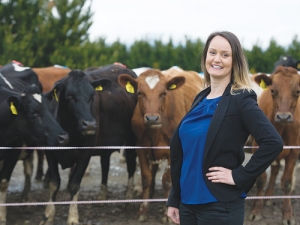News out of Europe was more interesting than the lacklustre Global Dairy Trade auction last week, says Rabobank dairy analyst Emma Higgins.
Signs of a slowdown in milk production in Europe are strengthening.
"EU's milk worm continues to turn with official Eurostat data indicating EU-28 milk production increased just 0.8% year-on-year in May 2016, down from a 1.7% growth in April 2016," Higgins told Dairy News.
"Interim data shows German and French production was down 3.3% and 3.5% in the last week of June respectively. These are the two largest milk producing states.
"Culling is also on the increase. May 2016 cow slaughtering data show increased culling among the major EU milk producing states. In the three months to May 2016, German cow slaughtering was up 14% versus the same period last year, and UK slaughtering was also up by 18% during the period.
"Cow culling is up in France and Ireland as well, by 7% and 4% respectively."
Fonterra says in its July Global Update that the April EU production increase of 1% vs the same month last year was the lowest rate of increase since early 2015. Half of the top eight producers decreased production vs the same month the previous year.
The overall price index remained unchanged at last week's Global Dairy Trade auction. The whole milk powder (WMP) index up was up 1.9% to an average US$2079/MT. Butter prices dipped 5%, while skim milk powder and cheddar also fell circa 1%. In contrast, anhydrous milk fat and casein prices were up slightly.
ASB's Nathan Penny says dairy markets have largely shrugged off effects of Brexit and the focus is now on the big picture – supply and demand.
"On that front we will be looking to see what happens with European supply, New Zealand supply and the others and see how that plays out and how it translates into prices from here."
Some longer term contacts for WMP showed a little promise, up by 3-4%.
"It's not much at this stage but it's a hint that buyers are thinking prices are going to lift at some stage," says Penny.
ASB is maintaining its $6/kgMS forecast. "We are continuing to look at that supply picture – for example while it's early days, Fonterra's June collections were down 10% on last year. We will see how that plays out but we think we might get a fall of up to 5% this season. If we start to get something like that as we get into the spring, prices will move quickly."
GDT results
AMF index up 0.2%, average price US$3,628/MT
Butter index down 5.0%, average price US$2,687/MT
BMP index down 0.5%, average price US$1,565/MT
Ched index down 1.1%, average price US$2,886/MT
LAC index down 4.0%, average price US$721/MT
RenCas index up 0.4%, average price US$5,286/MT
SMP index down 1.1%, average price US$1,927/MT
WMP index up 1.9%, average price US$2,079/MT


















